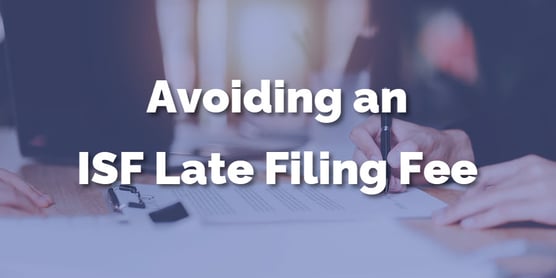If you've ever imported something from abroad, you're familiar with the many regulations and requirements that govern the global movement of goods. One of these requirements is an Importer Security Filing, or ISF.
This mandate demands accurate and timely submission of specific information about your cargo before it reaches the U.S. Late submissions can trigger an ISF late filing fee, which can cost you thousands of dollars.
Here's what you need to know to avoid penalties and maintain the uninterrupted flow of your cargo.
What Is an ISF?
 The ISF is a requirement imposed by U.S. Customs and Border Protection (CBP) for most cargo arriving by ocean vessel. It's also commonly referred to as the "10+2 Rule" since it consists of 10 data elements from the importer and two data elements from the carrier.
The ISF is a requirement imposed by U.S. Customs and Border Protection (CBP) for most cargo arriving by ocean vessel. It's also commonly referred to as the "10+2 Rule" since it consists of 10 data elements from the importer and two data elements from the carrier.
The purpose of the ISF is to enhance the security of the supply chain by providing the CBP with advance information about the goods being imported before they arrive in the U.S. This allows CBP to assess and manage potential risks associated with the cargo. Here’s the information that must be communicated on the ISF:
From the importer:
- Name and address of the manufacturer or supplier of the goods being imported.
- Name and address of the seller or owner of the goods being imported.
- Name and address of the buyer or owner of the goods being imported.
- Name and address of the entity that will take possession of the goods upon arrival in the U.S.
- The physical location where the cargo was loaded into the container.
- Name and address of the party who loaded the container, if different from the shipper.
- The identification number of the party responsible for the payment of duties and meeting all legal requirements of the importation (Importer of Record number or Foreign Trade Zone applicant).
- The IRS number, EIN or SSN of the consignee, if applicable.
- The country where the goods were manufactured, produced or grown (country of origin).
- The HS Code (Harmonized Tariff Schedule code) noting the exact commodities being imported.
From the carrier:
- Information about how the cargo is stowed on the vessel, including the container numbers, descriptions of the cargo, and their location on the vessel.
- Status updates about containers, such as when they're loaded, discharged or gated out.
If, after the filing is submitted — and before the goods enter the limits of a U.S. port — any of the information submitted changes, or more accurate information becomes available, you’re required to update the documentation. Similarly, if you no longer intend to import the goods, you must withdraw the ISF and explain why.
ISF Violations, Penalties and Costs
You or your agent (such as a customs broker or freight forwarder) are required to submit ISF information at least 24 hours before your cargo is loaded onto a vessel destined for the U.S.
If the ISF is not filed on time or if it contains inaccurate or incomplete information, CBP can hit you with an ISF late filing fee, or other costly penalties. The exact amount can range from a few hundred to several thousand dollars, depending on the circumstances of the late or incorrect filing.
In addition to financial penalties, failure to comply with ISF filing requirements could also result in cargo delays, inspections and potential disruptions to your supply chain.
Here's a breakdown of ISF violations — and what they can cost:
|
ISF Violation |
Penalty |
Penalty, cont. |
|
Failure to file |
Held or seized cargo |
If goods for which an ISF has not been filed arrive in the U.S., CBP will withhold the cargo until documentation is received, and any necessary examination is conducted. CBP also reserves the right to seize any merchandise. |
|
Late filing |
≤$5,000 |
If you (or your agent) submit a late ISF, CBP can impose an ISF late filing fee up to $5,000. |
|
Inaccurate filing |
≤$5,000 |
If your ISF is inaccurate, CBP can also claim up to $5,000. |
|
Updates or withdrawals |
≤$5,000 |
Submitting an inaccurate ISF update, or failing to withdraw one that’s no longer needed, can cost up to $5,000. |
The good news is that first-time violators of ISF rules may have their fines reduced to $1,000-$2,000, depending on the mitigating circumstances.
In addition, members of the Customs-Trade Partnership Against Terrorism (C-TPAT) will receive up to 50% penalty mitigation.
Avoiding ISF Filing Errors
To avoid an ISF late filing fee, you must have it filed no later than 24 hours before vessel departure. CBP uses the first bill of lading file date as a “proxy indicator” of ISF timeliness since the bill of lading must also be filed at least 24 hours before loading vessels.
CBP acknowledges that many bills of lading are filed several days before loading the vessel. Therefore, some of the “untimely” ISFs that show up on the ISF Progress Reports may actually be timely. CBP is now using the vessel departure date minus 24 hours to better assess ISF timeliness.
If you are involved in importing goods into the U.S. and feeling unsure about ISF requirements, deadlines, or the potential consequences of late or inaccurate filing, a knowledgeable freight forwarder will help you ensure compliance. To learn more, contact the experts at I.C.E. Transport.




